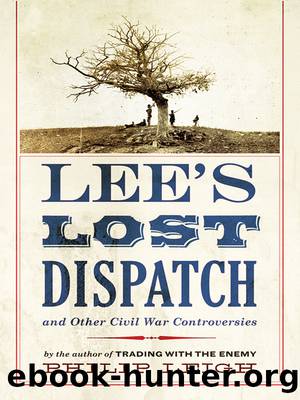Lee's Lost Dispatch and Other Civil War Controversies by Leigh Philip;

Author:Leigh, Philip; [Leigh, Philip]
Language: eng
Format: epub
Publisher: Westholme Publishing
A third reason Grant may have chosen Sherman was that Shermanâs political connections could benefit Grantâs career, whereas Thomas was a Virginian whose family could have no influence in Washington. Shermanâs father had been an Ohio State Supreme Court judge. Although he died when the boy was nine, the future general was raised by Thomas Ewing, a wealthy neighbor who would become his father-in-law. Ewing was also an influential US senator and served with four pre-Civil War presidents as secretary of the interior and treasury. When the Civil War started, the future generalâs brother, John, was one of Ohioâs US senators. John introduced him to Abraham Lincoln, who got him commissioned as a colonel before the first important battle at Bull Run in July 1861.44
CONCLUSION
Thomas would probably have been a better choice than Sherman to lead the Unionâs 1864 western spring offensive for two reasons.
First, he understood that the chief objective was to destroy the Confederate Army of Tennessee. Sherman was more focused on capturing Atlanta, even if it meant leaving the Rebel army intact to continue fighting. If Sherman had concentrated on demolishing the opposing army, the Civil War might have ended in autumn 1864 instead of April 1865. Such a decision in the west would have left the Confederacy with no way to prevent the armies of Sherman, Schofield, and Thomas from quickly reinforcing Grant at Petersburg, where they could overwhelm Lee. Given such a hopeless prospect, it is reasonable to suppose the Confederacy would have surrendered shortly after its chief western army was eliminated.
Second, on two occasions, Sherman failed to act on suggestions from Thomas that could likely have annihilated, or crippled, the opposing Confederate army. The first was at the beginning of the campaign in early May at Snake Creek Gap. Sherman only partially followed the suggestion by failing to put enough soldiers into the movement to attack Johnstonâs rear. In time he recognized the validity of the strategy and left the false impression in his memoirs that it was his idea. The second time was during the second day of the Battle of Jonesboro, when Sherman rejected Thomasâs recommendation that the Army of the Cumberland be sent to Lovejoy Station to cut off Hardeeâs retreat. Consequently, Hardee escaped.45
Nonetheless, thereâs no denying that Shermanâs capture of Atlanta virtually assured Lincolnâs reelection, confirming that the North had found the will to prosecute the war to a victorious conclusion. Moreover, Sherman won Atlanta and continued on a circuit through the Deep South, finally almost reaching the back door of Leeâs army in Virginia at the end of the war. He did so by suffering far fewer casualties than Grant. However, during that march, Thomas destroyed the Army of Tennessee for him at the Battle of Nashville in December 1864.
Download
This site does not store any files on its server. We only index and link to content provided by other sites. Please contact the content providers to delete copyright contents if any and email us, we'll remove relevant links or contents immediately.
In Cold Blood by Truman Capote(3374)
The Innovators: How a Group of Hackers, Geniuses, and Geeks Created the Digital Revolution by Walter Isaacson(3144)
Steve Jobs by Walter Isaacson(2889)
All the President's Men by Carl Bernstein & Bob Woodward(2363)
Lonely Planet New York City by Lonely Planet(2216)
And the Band Played On by Randy Shilts(2197)
The Room Where It Happened by John Bolton;(2150)
The Poisoner's Handbook by Deborah Blum(2132)
The Innovators by Walter Isaacson(2096)
The Murder of Marilyn Monroe by Jay Margolis(2094)
Lincoln by David Herbert Donald(1981)
A Colony in a Nation by Chris Hayes(1927)
Being George Washington by Beck Glenn(1910)
Under the Banner of Heaven: A Story of Violent Faith by Jon Krakauer(1788)
Amelia Earhart by Doris L. Rich(1687)
The Unsettlers by Mark Sundeen(1682)
Dirt by Bill Buford(1669)
Birdmen by Lawrence Goldstone(1662)
Zeitoun by Dave Eggers(1643)
